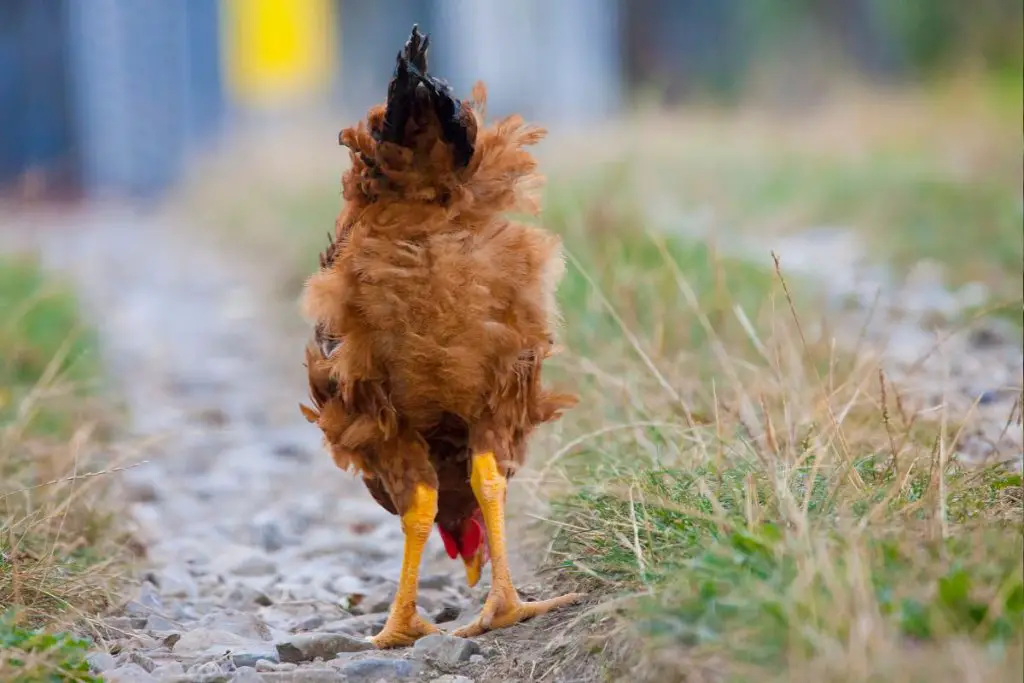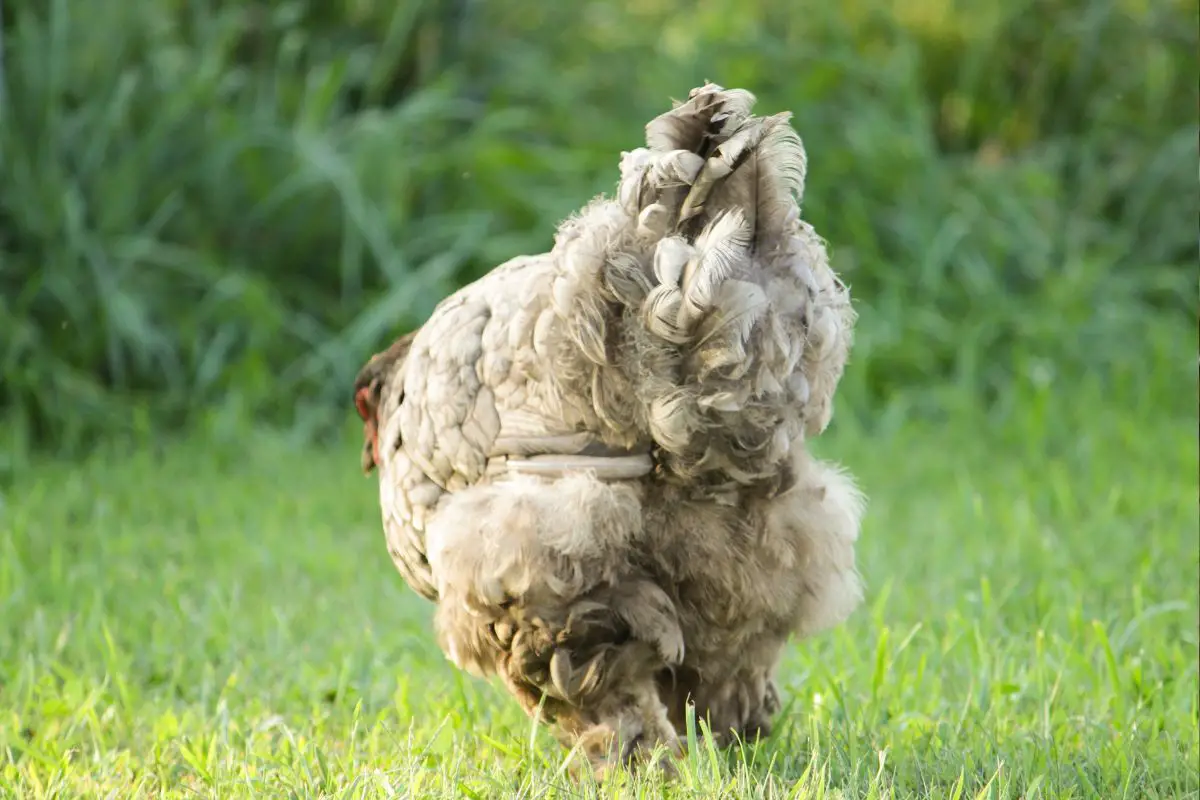Also known as paste up, pasted vent, or pasting up, pasty butt in chickens is a common condition that occurs when dried fecal matter builds up near a baby chick’s vent.
If left untreated, pasty butt can be fatal since the chick cannot eliminate feces naturally and it gets blocked, thereby causing death.
Fortunately, pasty butt is easy to identify, prevent, and treat, but since the condition is very common and potentially life-threatening, every chicken keeper should watch out for it.
In this article, you’ll find everything you need to know about pasted vent or pasty butt, so you can take better care of your baby chicks.
So here we go!
Table of Contents
What is Pasty Butt?
Pasty butt is a condition in which the chick’s poop (droppings) stick around the vent. Other names for this condition include paste up, pasting, sticky bottoms, and pasted vent.
The poop typically blocks the vent and may even dry on the vent, producing an even larger blockage. The chick is then unable to eliminate poop, which ends up accumulating in the body.
The accumulated body waste blocks the baby chick’s digestive system and causes pathogens to multiply in the chick’s body.
Sadly, pasty butt can cause death quite easily if it is not handled promptly, so learning how to identify and treat the condition is of the utmost importance.
Causes of Pasty Butt in Chickens
There are many factors that can cause pasty butt in baby chicks. These include:
- Stressful situations: Chicks with limited space in the incubator experience a lot of stress just like baby chicks delivered by the postal system do. If your chicks are terrified by loud sounds or rough handling by overexcited children, they may also experience stress.
- Food: baby chicks are undeniably cute and adorable. That’s why some backyard chicken keepers opt to give them some yummy treats. However, baby chicks are unable to process treats. Instead, they require a high-quality chicken starter feed.
- Heat: excess heat can also cause pasty butt in chicks. Overheating is commonly experienced in brooders using hanging heat lamps, especially if the baby chicks are overcrowded and have no sufficient space to stay away from the source of heat.
- Cold: if chicks are left in cold conditions for several hours, they may also develop pasted vent. This often occurs during transport or shipping because the chicks can be left in chilly depots for many hours during the delivery process.
Parasitic infections like coccidiosis can make chicken poop loose, so they can also be an indirect cause of pasting in birds.
How to Recognize It
It’s important to check every chick immediately you get them before placing them in a brooder box, especially if you have purchased them from a farm store or they have been shipped by mail.

If they have been incubated, check every chick when transferring them from the incubator to the brooder box.
In both cases, you should see a matted piece of dark brown poop attached to the vent area if the chick has developed pasty butt. Remember not to confuse the vent area with the belly button.
You should check the chick’s butt frequently to ensure there’s no build-up of pasty butt. The condition mostly affects chicks during the first week or second week of their life as they get used to their new environment and food.
Pasty Butt Symptoms
Some common signs and symptoms to watch out for include:
- Protruding backside
- Slow or no growth
- Lethargy or weakness
- Lack of appetite
- Lack of sleep
It’s always better to spot these signs of pasty butt in chickens early on to increase the chances of your chicks’ survival.
How to Bathe and Care for Chicken with Pasty Butt
As we’ve already stated, it’s not uncommon for baby chicks who are bought at a feed store or shipped via mail to develop pasty butt. So check every chick for pasty butt immediately they reach home. Fortunately, pasty butt is easy to spot and treat.
Here are some tips to follow when caring for your sick baby chicks or adult:
- Check the vent: make sure to check the vent carefully for pasting.
- Clean their vent: soften any dried feces either using a wet, warm cloth or by soaking their rear end in a shallow container of warm water. Once the dried poop has softened, gently run a soft cotton swab downwards to get rid of the material. Avoid pulling out any dried fecal matter as this may also pull out the chick’s downy feathers and cause bleeding.
- Dry your chicks: avoid chilling the chicks by drying them off thoroughly using a soft, clean paper towel. You can also utilize a hair dryer on a low heat setting to completely dry their feathers without burning the chick’s skin. Keep your chicks warm because baby chicks experience chill when damp. Wet feathers can also expose the vent and put your chicken at risk of bullying and pecking by other chickens. If pasty butt is a serious issue, apply a small amount of vaseline, petroleum jelly, or vegetable oil to the vent area to prevent a potential recurrence.
- Place the chick back in the brooder: once the vent is completely clean and dry, you can safely place your chick back in your brooder.
How to Prevent Pasty Butt in Your Chickens
To help prevent pasty butt in your chicken, follow the following tips:
- Keep your brooder and chicken coop clean and comfortable: this will help prevent bacteria growth that could worsen the situation. Make the brooder comfortable for your chicks by supplying them with healthy feed and clean water all the time. Also, keep their bedding clean to prevent microbes that could worsen the problem.
- Maintain proper brooder temperature: make sure the brooder temperature is not too cold or too warm as new chicks cannot properly regulate their body temperature. Young chicks are likely to get too hot or chilled if you don’t get the temperature right and both can be detrimental to your chicks’ health.
- Feed them a complete chick starter feed only: the best starter grower feeds contain essential nutrients for your chicks’ optimal growth and development. Also, give your chicks water every day to ensure proper hydration.
- Eliminate potential stressors: once you have purchased your chicks, place them into a clean, warm brooder immediately.
- Provide enough space: chicks can grow very quickly, so be sure to give them plenty of space. Each chick’s behavior can help you determine if the space is enough.
- Add grit to treats: if you want to give your chicks any treats, be sure they have grit. Chickens have no teeth, so they require grit to grind anything besides starter chick feed and probiotics.
- Use a high-quality heat source: this will help provide enough warmth without exposing the chicks to extreme temperatures.
- Check their vents regularly: if your chicks are sick, clean the area around the vent and dry it off.
Consult your vet if you notice anything abnormal or you suspect a serious underlying condition like coccidiosis.
Conclusion
Treating newly-hatched chicks for a pasty butt is quite easy. However, the condition can lead to death if it’s ignored, so prompt intervention is extremely important.
Practicing preventive measures is the best way to minimize the chances of losing your flock to pasting. If you notice a problem, deal with it immediately. And if in doubt, consult your vet as soon as possible.

